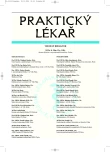-
Medical journals
- Career
Biologic treatment for rheumatoid arthritis
Authors: K. Trnavský
Authors‘ workplace: Arthrocentrum, Praha
Published in: Prakt. Lék. 2008; 88(12): 725-727
Category: Of different specialties
Overview
Biologic treatment – the administration of monoclonal antibodies against cytokines and immunocompetent cells that participate in the rheumatoid inflammation – can be considered a major advance in the therapy of rheumatoid arthritis. The main problem with this form of therapy is the cost factor. Therefore, indications for biological therapy, approaches in case of treatment failure and the duration of administration are still under discussion. Adverse reactions are also not negligible – particularly infections including the activation of tuberculosis.
Key words:
rheumatoid arthritis, biologic treatment.
Sources
1. Furst, P.E., Breeveld, F.C., Kalden, J.R., et al. Updated consensus statement on biological agents for the treatment of rheumatic diseases 2007. Ann. Rheum. Dis. 2007, 66 (Suppl.1), p. 2-12.
2. Genant, H.K., Peterfy, C.G., Westhovens, R. et al. Abatecept inhibits progression of structural damage in rheumatoid arthritis-results from the long-term extension of the AIM trial. Ann. Rheum. Dis. 2008, 67, p. 1084-1089.
3. Hjarden, C., Ostergaard, M., Podenphaut, J. et al. Do rheumatoid arthritis patients in clinical practice benefit from switching from infliximab to a second tumor necrosis factor sloha inhibitor? Ann. Rheum. Dis. 2007, 66, p. 1184-1189.
4. Lukáč, J., Lukáčová, O., Rovenský, J. et al. Etarnecept v liečbe reumatoidnej artritidy – 3 ročná skúsenosť v SR. Reumatologia 2008, 22, s. 124-128.
5. Maini, R.N., Taylor, D.C., Paleolog, E. et al. Anti-tumor necrosis factor specific antibody ( infliximab ) treatment provides insight into the pathophysiology of rheumatoid arthritis. Ann. Rheum. Dis. 1999, 58 (Suppl.1), p. 156-160.
6. Maini, R.N., Taylor, P.C., Szechinski, J., Pavelka, K. et al. Double-blind randomized controlled clinical trial of the interleukin-6 receptor antagonist, tocilizumab, in European patients with rheumatoid arthritis who had an incomplete response to methotrexate. Arthritis & Rheumatism 2006, 54, p. 2817-2829.
7. Pavelka, K. Biologická léčba revmatických onemocnění. Vnitř. lék. 2006, 52, s. 561-562.
8. Shaw, T., Quan, J., Totoritis, M.C. B cell therapy for rheumatoid arthritis-the rituximab experience. Ann. Rheum. Dis. 2003, 62, p. 55-59.
9. Vencovský, J., Tegzová, D., Krofta, K., Pavelka, K. Doporučení České revmatologické společnosti k biologické léčbě blokátory TNF – doplnění standartních léčebných postupů u revmatoidní artritidy. Čes.Revmatol. 2004, 12, s. 20–29.
10. Vencovský, J. Revmatoidní artritida a biologická terapie. Trendy ve farmakoterapii, 2003, 2, s. 7-9.
11. Vencovský, J. Současné možnosti léčby revmatoidní artritidy. Farmakoterapie 2008, suppl. 2, s. 71-79.
Labels
General practitioner for children and adolescents General practitioner for adults
Article was published inGeneral Practitioner

2008 Issue 12-
All articles in this issue
- A brief review of radiotherapy of rectal cancer
- Spiritual care in Czech hospitals
- Biologic treatment for rheumatoid arthritis
- Alcohol related problems– interaction of risk and protective factors
- Sigmoid volvulus – untypical condition in childhood
- Cardiac rehabilitation – an efficient, but neglected treatment
- Idiopathic thrombocytopenic purpura
- Candida biofilms – a current problem of clinical practice
- Contemporary approaches to osteosynthesis of child fractures
- Tumour markers in prostate cancer. A new horizon?
- Percutaneous endoscopic gastrostomy – experience of one PEG centre in years 2002–2008
- General Practitioner
- Journal archive
- Current issue
- Online only
- About the journal
Most read in this issue- Idiopathic thrombocytopenic purpura
- Percutaneous endoscopic gastrostomy – experience of one PEG centre in years 2002–2008
- Contemporary approaches to osteosynthesis of child fractures
- Sigmoid volvulus – untypical condition in childhood
Login#ADS_BOTTOM_SCRIPTS#Forgotten passwordEnter the email address that you registered with. We will send you instructions on how to set a new password.
- Career

